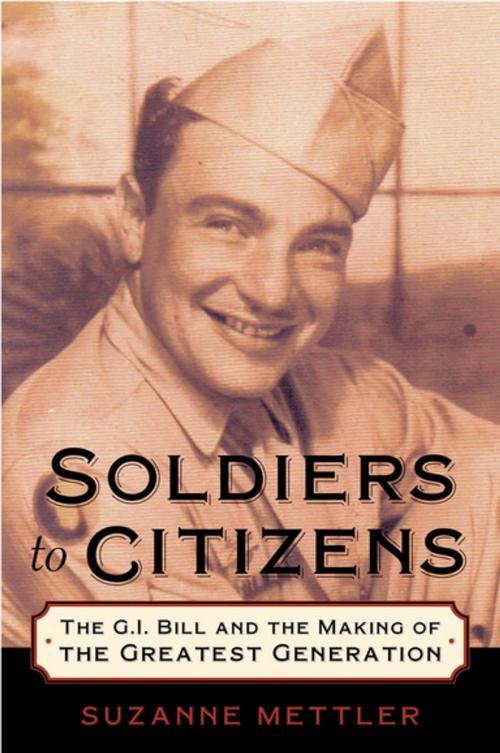Soldiers to Citizens
The G.I. Bill and the Making of the Greatest Generation
Nonfiction, History, Military, Veterans, Social & Cultural Studies, Political Science, Government, Civics, Americas, United States, 20th Century| Author: | Suzanne Mettler | ISBN: | 9780199887095 |
| Publisher: | Oxford University Press | Publication: | September 10, 2007 |
| Imprint: | Oxford University Press | Language: | English |
| Author: | Suzanne Mettler |
| ISBN: | 9780199887095 |
| Publisher: | Oxford University Press |
| Publication: | September 10, 2007 |
| Imprint: | Oxford University Press |
| Language: | English |
"A hell of a gift, an opportunity." "Magnanimous." "One of the greatest advantages I ever experienced." These are the voices of World War II veterans, lavishing praise on their beloved G.I. Bill. Transcending boundaries of class and race, the Bill enabled a sizable portion of the hallowed "greatest generation" to gain vocational training or to attend college or graduate school at government expense. Its beneficiaries had grown up during the Depression, living in tenements and cold-water flats, on farms and in small towns across the nation, most of them expecting that they would one day work in the same kinds of jobs as their fathers. Then the G.I. Bill came along, and changed everything. They experienced its provisions as inclusive, fair, and tremendously effective in providing the deeply held American value of social opportunity, the chance to improve one's circumstances. They become chefs and custom builders, teachers and electricians, engineers and college professors. But the G.I. Bill fueled not only the development of the middle class: it also revitalized American democracy. Americans who came of age during World War II joined fraternal groups and neighborhood and community organizations and took part in politics at rates that made the postwar era the twentieth century's civic "golden age." Drawing on extensive interviews and surveys with hundreds of members of the "greatest generation," Suzanne Mettler finds that by treating veterans as first-class citizens and in granting advanced education, the Bill inspired them to become the active participants thanks to whom memberships in civic organizations soared and levels of political activity peaked. Mettler probes how this landmark law produced such a civic renaissance. Most fundamentally, she discovers, it communicated to veterans that government was for and about people like them, and they responded in turn. In our current age of rising inequality and declining civic engagement, Soldiers to Citizens offers critical lessons about how public programs can make a difference.
"A hell of a gift, an opportunity." "Magnanimous." "One of the greatest advantages I ever experienced." These are the voices of World War II veterans, lavishing praise on their beloved G.I. Bill. Transcending boundaries of class and race, the Bill enabled a sizable portion of the hallowed "greatest generation" to gain vocational training or to attend college or graduate school at government expense. Its beneficiaries had grown up during the Depression, living in tenements and cold-water flats, on farms and in small towns across the nation, most of them expecting that they would one day work in the same kinds of jobs as their fathers. Then the G.I. Bill came along, and changed everything. They experienced its provisions as inclusive, fair, and tremendously effective in providing the deeply held American value of social opportunity, the chance to improve one's circumstances. They become chefs and custom builders, teachers and electricians, engineers and college professors. But the G.I. Bill fueled not only the development of the middle class: it also revitalized American democracy. Americans who came of age during World War II joined fraternal groups and neighborhood and community organizations and took part in politics at rates that made the postwar era the twentieth century's civic "golden age." Drawing on extensive interviews and surveys with hundreds of members of the "greatest generation," Suzanne Mettler finds that by treating veterans as first-class citizens and in granting advanced education, the Bill inspired them to become the active participants thanks to whom memberships in civic organizations soared and levels of political activity peaked. Mettler probes how this landmark law produced such a civic renaissance. Most fundamentally, she discovers, it communicated to veterans that government was for and about people like them, and they responded in turn. In our current age of rising inequality and declining civic engagement, Soldiers to Citizens offers critical lessons about how public programs can make a difference.















